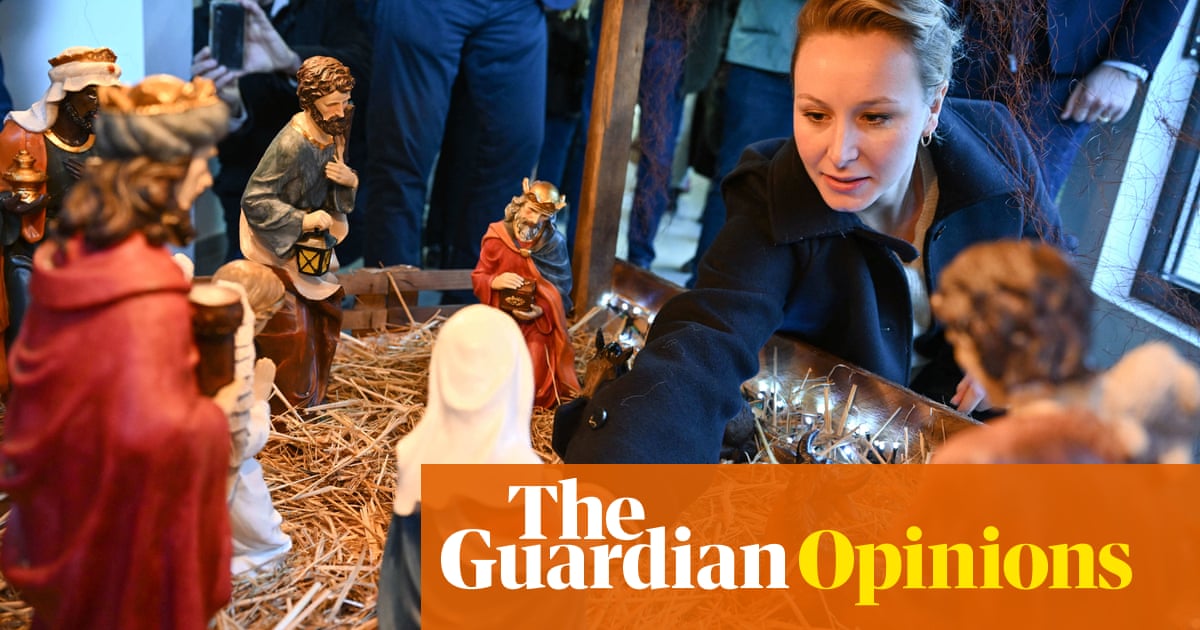
Christmas wouldn’t be Christmas in France without a good old-fashioned brouhaha about cribs and candles in official buildings. The season of goodwill is an annual occasion for a highly politicised bout of ill will between traditionalists, who see a nativity scene in the town hall as an expression of France’s Christian heritage, and secularists, who say it violates la laïcité (secularism), the strict separation of state and religion enshrined in a 1905 law.
The squabbles are so fierce, yet so petty, that they recall Clochemerle, Gabriel Chevallier’s 1934 satire about a feud over the erection of a public pissotière (urinal) in the church square of a bucolic village. The comic novel pits a secular republican mayor and schoolteacher against the reactionary local priest, aristocrat and notary.
Chevallier poked fun at the battles between anticlerical secularists and Catholic traditionalists that have divided France since the 1789 revolution and climaxed in the late 19th-century Dreyfus affair, in which a Jewish army officer was wrongfully convicted of espionage and sent to Devil’s Island before being acquitted on appeal after a national outcry. The church’s anti-Dreyfus role led directly to the 1905 law, under which the state declared itself neutral on religion while vowing to uphold freedom of worship.
France’s secular warriors continue their struggle today, even though the battle is more frequently over the place of Islam in public life than about Christianity. France in the 21st century has banned the wearing of Muslim headscarves and other “ostentatious religious symbols” in schools and by public officials. The education ministry recently banned the full-length abaya gown in schools.
Today’s rows are a godsend for Marine Le Pen’s far-right National Rally party, furnishing a welcome opportunity to position itself as the defender of France’s Christian traditions, while simultaneously demanding the strictest secularism when it comes to Islam. Activists from the Human Rights League and associations for the defence of secularism once again took legal action this year to try to stop National Rally mayors from installing cribs in the town halls they run in half a dozen municipalities across southern France, at the risk of playing into Le Pen’s hands.
The country’s highest administrative court, the council of state, last year ordered the National Rally mayor of Beaucaire, Julien Sanchez, to remove a traditional Provençal crèche made of figurines known as santons (little saints) from his town hall, rejecting his argument that the nativity scene was part of local culture and not religious.
The court ruled that installing a crèche in a public building such as a town hall “is not in conformity with the principle of neutrality, except in particular circumstances where it has a recognised cultural, artistic or festive character without expressing recognition of a religion or displaying a religious preference”. But a defiant Sanchez inaugurated the same decoration this year, declaring: “We are perpetuating tradition with this crèche.”
Just up the road in my adopted home town, Saint-Rémy-de-Provence, the centre-left council puts up festive street lighting and a decorated Christmas tree outside the church. Two councillors played parts in the annual outdoor nativity play. But the crib is firmly in the church, not the town hall. And the mayor, Hervé Chérubini, wishes people a “joyous end-of-year festive season”, not a merry Christmas.
The rightwing mayor of Béziers, Robert Ménard, went one better, inviting clergy of all faiths to a ceremony inaugurating a nativity scene in his municipal building. Just in case of legal trouble, the crèche is on wheels, so it can be shunted outdoors if necessary.
And Louis Aliot, mayor of Perpignan for Le Pen’s party, who was ordered to remove an offending crib by the regional administrative court last year, outsmarted his opponents this year by putting it in a wooden shed just outside the town hall gate so it can be seen through a window in the courtyard. Technically, it is not in a public building, and hence it is legal, the court ruled, dismissing this year’s challenge.
Secularists’ outrage is not confined to crèches. Emmanuel Macron incurred their ire when he hosted a ceremony at the presidential Élysée palace in which the chief rabbi, Haïm Korsia, lit the first candle for the Jewish festival of Hanukkah this month. The head of state had attended a similar ceremony in a synagogue, but never in his office. Even the head of the Jewish representative council, Yonathan Arfi, called the event “a mistake”.
“This act shows the triumph of multiculturalism over universal values and of religious clientelism over citizenship,” thundered Caroline Fourest, a leading secularist who edits the weekly newspaper Franc-Tireur. “It wasn’t a candle that Haïm Korsia lit, but a firestorm.”
How could teachers explain the principle of secularism to Muslim pupils, who are convinced that laïcité is targeted only at them, if they see crèches in town halls and Hanukkah candles at the Élysée, she asked.
It’s a fair question. But perhaps France’s secularists need to lighten up a bit, join the festive spirit and let people celebrate their diverse traditions in public spaces. It won’t shake the secular pillars of the republic.
Paul Taylor is a senior fellow of the Friends of Europe thinktank









